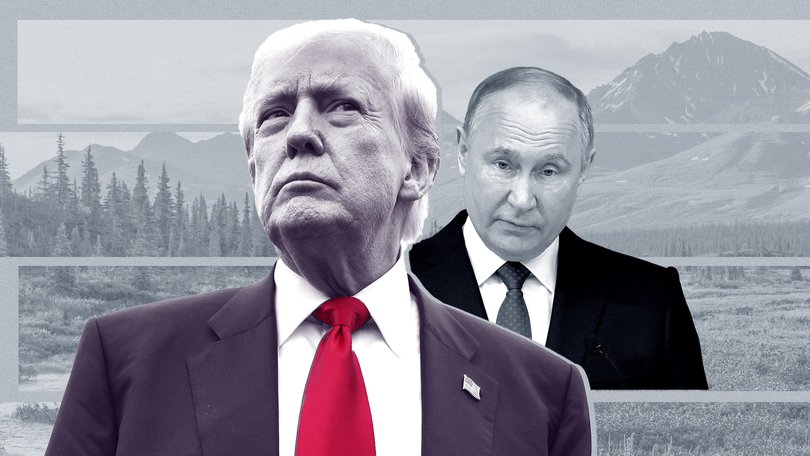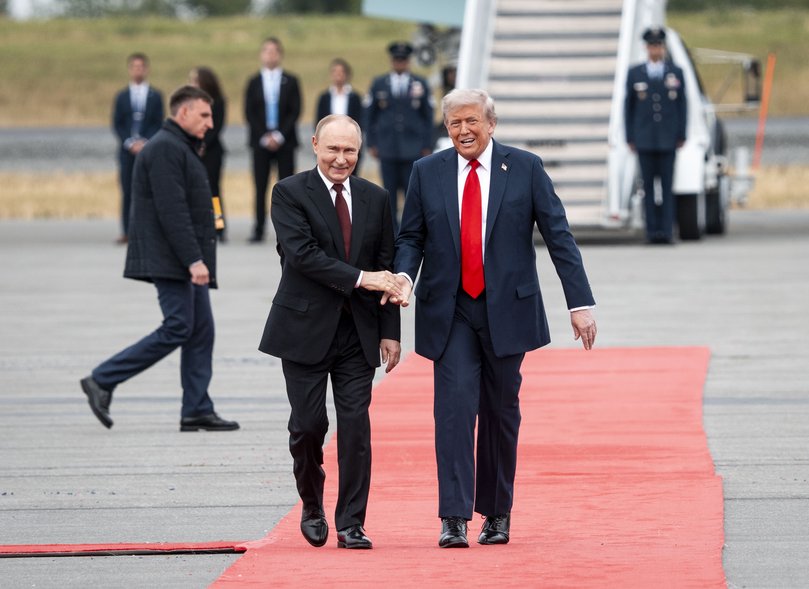Putin’s Trump Strategy: Lots of flattery, and talk of business deals
THE NEW YORK TIMES: The Russian president’s charm offensive has helped him head off repeated deadlines and sanctions threats by Donald Trump without curtailing Russia’s war effort.

After weeks of rising tensions with President Donald Trump, President Vladimir Putin of Russia picked up the phone.
The Kremlin said Russia had initiated the call Thursday between the two leaders, a telling acknowledgment of a Russian priority as important as any battlefield in Ukraine: appeasing Trump.
Even as Putin has pounded Ukrainian cities and waged grinding warfare in the country’s east, he has invested dozens of hours into flattering Trump, dangling the prospect of Russian-American business deals and sending the message that Russia is open to talks to end its invasion.
Sign up to The Nightly's newsletters.
Get the first look at the digital newspaper, curated daily stories and breaking headlines delivered to your inbox.
By continuing you agree to our Terms and Privacy Policy.The tactic has helped Putin head off repeated deadlines and sanctions threats by the American president without curtailing Russia’s war effort.
In June, a time when some Republican allies of Trump were pushing for sanctions against Russia, Putin called Trump to wish him a happy birthday; Trump said Putin had acted “very nicely,” and the sanctions never appeared.

In August, as Trump was threatening to enforce a 12-day deadline for Putin to end the war, the Russian leader hosted Steve Witkoff, the White House envoy and close friend of Trump, for a three-hour meeting that set the stage for the two presidents’ summit in Alaska.
This week, the ceasefire in the Gaza Strip gave Putin a new pretext to call — and praise — Trump. More relevant to Putin, however, was the fact that President Volodymyr Zelensky of Ukraine was visiting the White House on Friday.
“We proposed the phone conversation on the heels of President Trump’s successful trip to the Middle East,” Putin’s spokesperson, Dmitry S. Peskov, said Friday. “President Putin’s first thought, of course, was to congratulate Trump on such a success.”
Thursday’s call, coming after Trump’s threats to send Ukraine powerful Tomahawk cruise missiles “if this war doesn’t get settled,” was Putin’s eighth phone conversation with the American leader this year. He has held five hourslong, in-person meetings with Witkoff.
Combined with the August summit in Alaska, Putin has held about as many meetings and calls with Trump and Witkoff this year as he has with his closest international ally, President Alexander G. Lukashenko of Belarus, according to official Kremlin statements.
In recent weeks, it had looked as if the public bonhomie on display in Alaska between Putin and Trump had failed to produce any diplomatic progress. Blaming Europe, Sergei A. Ryabkov, a Russian deputy foreign minister, said last week that the “powerful momentum generated by Anchorage” had been “largely exhausted.”
But Putin appeared ready to give it another shot. On October 10, asked about Trump not being awarded the Nobel Peace Prize, Putin told reporters the award had lost credibility. Trump posted the video of those comments to his Truth Social account the same day, writing, “Thank you to President Putin!”
By Friday, after his call with Trump, Putin was already preparing for another summit, while signaling that an end to the war in Ukraine was still a ways off. He took a call from Viktor Orban, the Hungarian prime minister, to discuss a possible Trump-Putin meeting in Budapest.
But the Kremlin’s statement about that call added that Putin told Orban that U.S. and Russian officials would first need to “discuss the algorithm for further actions in the context of finding ways to peacefully resolve the Ukrainian crisis.”
The Kremlin was also getting more creative in trying to appeal to Trump not only by praising him, but also by pitching business deals.
In February, Putin said American companies could help develop aluminum production in Siberia and help mine rare earth metals in Russian-occupied Ukraine. On Thursday, one of his senior aides, Kirill Dmitriev, posted on social platform X that Elon Musk’s tunneling company could build a “Putin-Trump tunnel” between eastern Russia and Alaska.
“We also spent a great deal of time talking about Trade between Russia and the United States when the War with Ukraine is over,” Trump posted on social media after Thursday’s call. It was unclear what kind of trade was discussed.
From the Kremlin’s perspective, the charm offensive has been well worth the effort even though it has not yet resulted in business deals being announced, let alone in Trump conceding to Putin’s wide-ranging demands over Ukraine. But it appears to have succeeded in stopping Trump from significantly increasing American assistance to Ukraine.
A renewed sign of that came after Thursday’s call, when Trump expressed doubts about whether he would be willing to provide Tomahawk cruise missiles to Ukraine.
“Putin hasn’t wasted any time in learning how to massage Trump’s ego,” said Alexander Gabuev, director of the Carnegie Russia Eurasia Center. He predicted that the United States would pause meaningful aid deliveries to Ukraine while a potential Budapest summit was being prepared. “Even if that buys Russia a month — it’s already a good investment.”
This article originally appeared in The New York Times.
© 2025 The New York Times Company
Originally published on The New York Times
